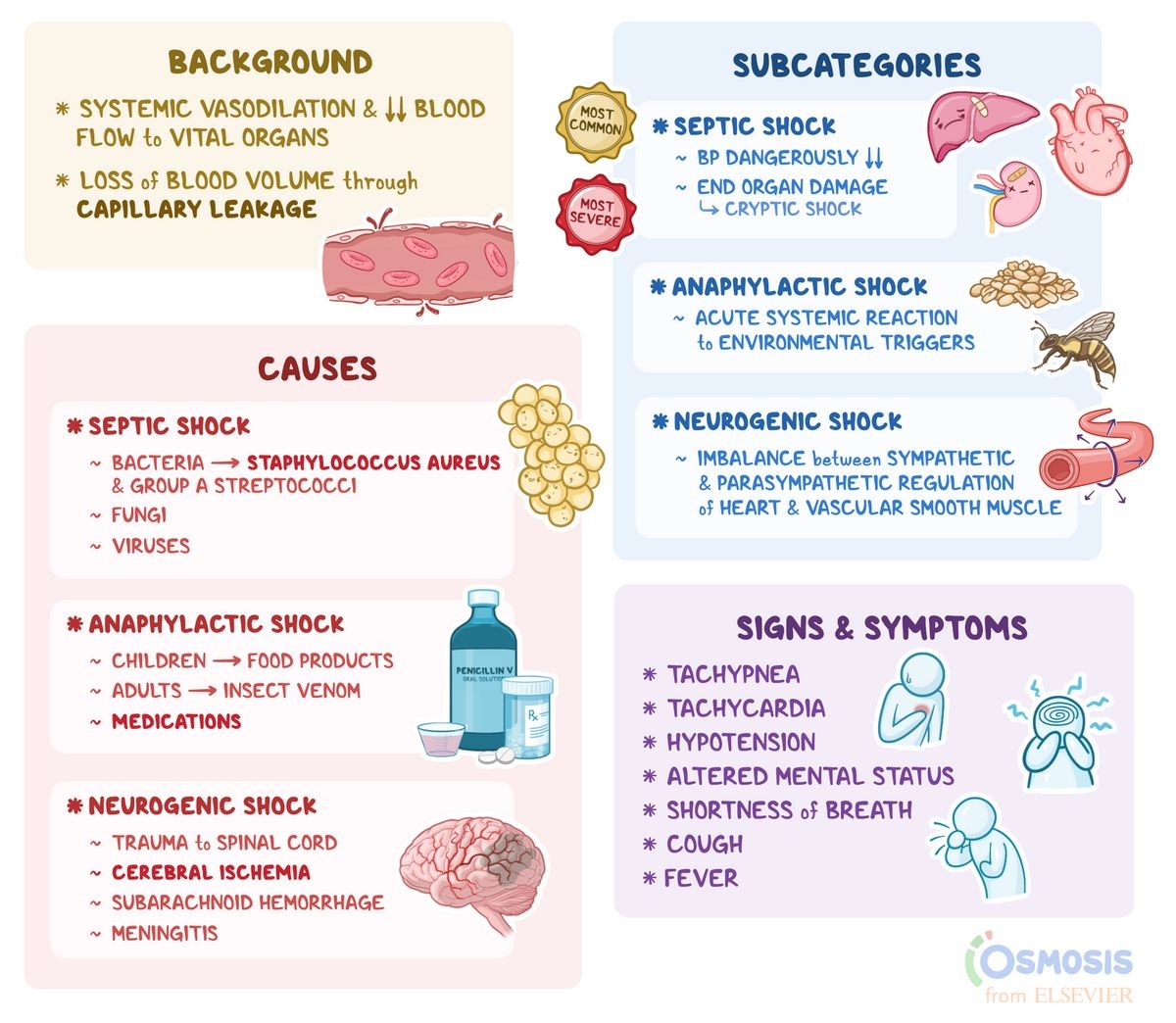
Contents
- 1 Shock: 5 Types, Treatment, Symptoms & 8 Main Causes
- 1.0.1 What are the 5 types of shock?
- 1.0.2 What are the 8 main causes of shock?
- 1.0.3 What are the symptoms of shock?
- 1.0.4 When should I seek medical care for shock?
- 1.0.5 What is the treatment for shock?
- 1.0.6 Can shock be prevented?
- 1.0.7 What is the outlook for shock?
- 1.0.8 Subscribe to MedicineNet’s Skin Care & Conditions Newsletter
Shock: 5 Types, Treatment, Symptoms & 8 Main Causes
Shock is a life-threatening medical condition resulting from insufficient blood flow throughout the body. It often accompanies severe injury or illness. Medical shock is a medical emergency and can lead to other conditions such as hypoxia, cardiac arrest, or organ damage. Immediate treatment is necessary as symptoms can worsen rapidly.
While medical shock is different from emotional or psychological shock following a traumatic event, it is equally important to address.
What are the 5 types of shock?
The types of shock include septic, anaphylactic, cardiogenic, hypovolemic, and neurogenic shock.
Septic shock results from bacteria multiplying in the blood and releasing toxins, caused by various infections such as pneumonia or urinary tract infections.
Anaphylactic shock is a severe allergic reaction to things like insect stings, medicines, or certain foods.
Cardiogenic shock occurs when the heart is damaged and unable to supply sufficient blood to the body, often due to a heart attack or congestive heart failure.
Hypovolemic shock is caused by severe blood and fluid loss, such as from traumatic injury or severe anemia.
Neurogenic shock is caused by spinal cord injury, typically resulting from a traumatic accident.
What are the 8 main causes of shock?
The main causes of shock include heart conditions, bleeding, dehydration, infection, severe allergic reactions, spinal injuries, burns, and persistent vomiting or diarrhea.
What are the symptoms of shock?
The key signs of shock are low blood pressure and rapid heart rate (tachycardia). Other symptoms include rapid, shallow breathing, cold and clammy skin, rapid and weak pulse, dizziness or fainting, and weakness.
Additional symptoms may vary depending on the type of shock and may include staring eyes, anxiety or agitation, seizures, confusion or unresponsiveness, low or no urine output, bluish lips and fingernails, sweating, and chest pain.
When should I seek medical care for shock?
Medical shock is a medical emergency. If you suspect shock following an injury, even if the person seems stable, call 911 or get them to an emergency department immediately. Prompt treatment can save a person’s life.
The earlier shock is treated, the better, as it reduces the risk of organ damage.
What is the treatment for shock?
Treatment for shock depends on the type and cause. In general, fluid resuscitation with an IV is the first-line treatment for all types of shock. Medications such as epinephrine, norepinephrine, or dopamine may also be administered to raise blood pressure and ensure blood flow to vital organs.
Tests, such as X-rays, blood tests, and EKGs, will determine the underlying cause and severity of the illness.
Medical treatment
Septic shock is treated with antibiotics and fluids to increase and maintain blood pressure.
Anaphylactic shock is treated with medications such as diphenhydramine, epinephrine, steroid medications, and sometimes H2-Blocker medication.
Cardiogenic shock is treated by identifying and treating the underlying cause, which may require surgical procedures or medications to support heart function.
Hypovolemic shock is treated with fluids and identifying and correcting the underlying cause of bleeding.
Neurogenic shock is difficult to treat, with immobilization, anti-inflammatory medicine, fluids, monitoring, and sometimes surgery as treatment options.
Self-care at home
If someone has symptoms of shock, immediate medical attention is necessary. Check the person’s airway, breathing, and circulation (the ABCs). Administer CPR if trained. Keep the person lying down with feet elevated, keep them warm, and loosen tight clothing. Do not give fluids by mouth, and provide appropriate first aid for any injuries. Apply direct pressure to significant bleeding wounds.
Can shock be prevented?
To prevent shock, measures should be taken to prevent heart disease, injuries, dehydration, and other potential causes. Those with known allergies should carry an epinephrine pen and avoid severe allergy triggers.
What is the outlook for shock?
Prompt treatment is crucial for a positive outcome. The prognosis depends on the cause of the shock, the patient’s general health, and the promptness of treatment and recovery.
Hypovolemic shock and anaphylactic shock generally respond well to early medical treatment. Septic shock has a higher mortality rate but can be improved with prompt antibiotic administration and fluid treatment. Cardiogenic shock has a poor prognosis, while spinal shock’s prognosis is also unfavorable, although research is advancing in spinal injury treatment.
Subscribe to MedicineNet’s Skin Care & Conditions Newsletter
By clicking "Submit," I agree to the MedicineNet Terms and Conditions and Privacy Policy. I also agree to receive emails from MedicineNet and understand that I may opt-out of MedicineNet subscriptions at any time.
Medically reviewed by Joseph Palermo, DO; American Osteopathic Board Certified Internal Medicine
References:
MedscapeReference.com. Septic Shock Prognosis.
MedscapeReference.com. Cardiogenic Shock.


